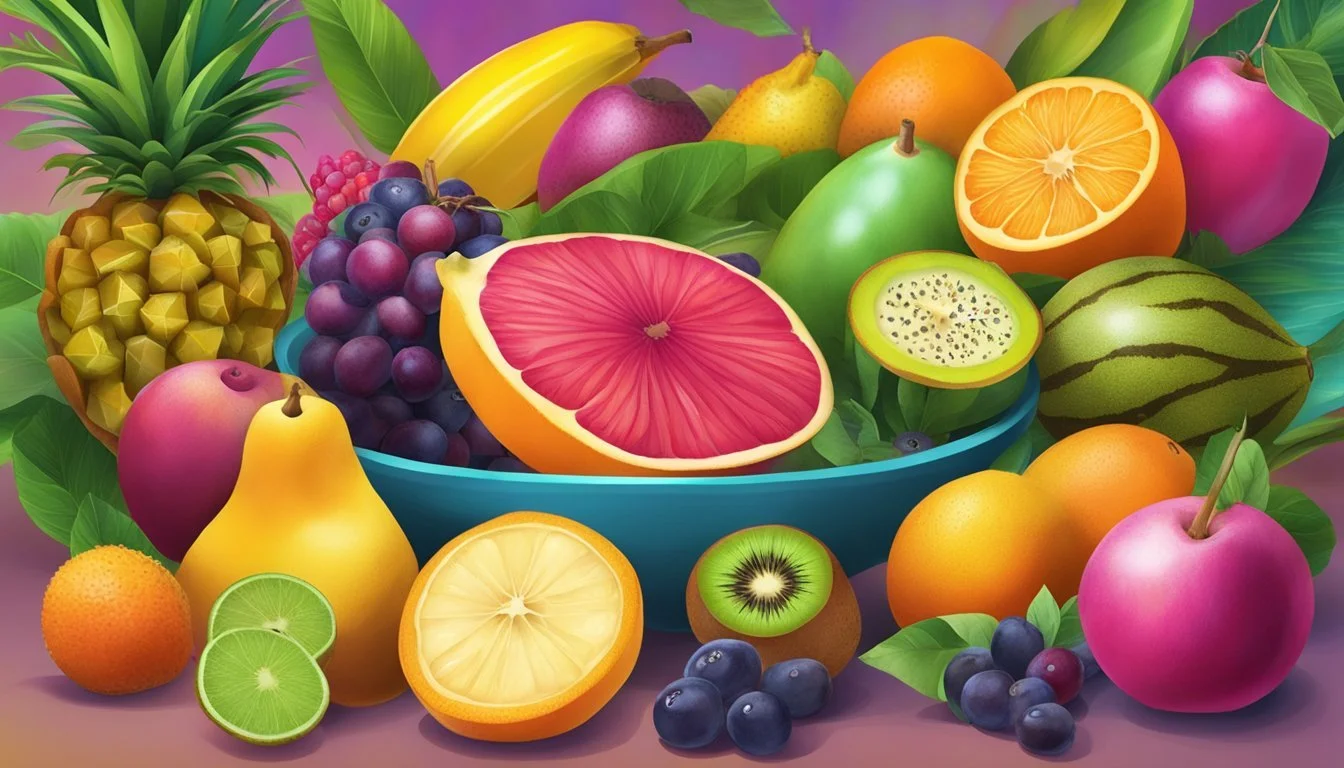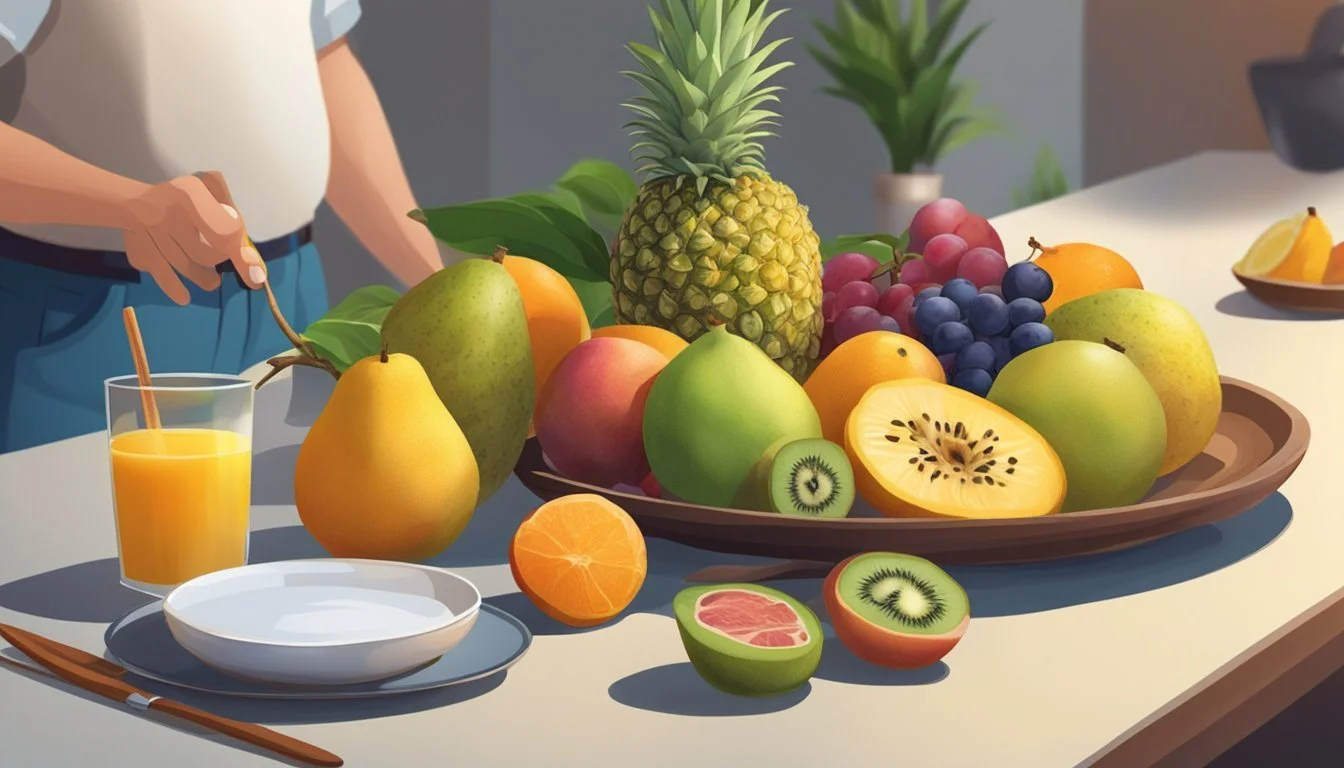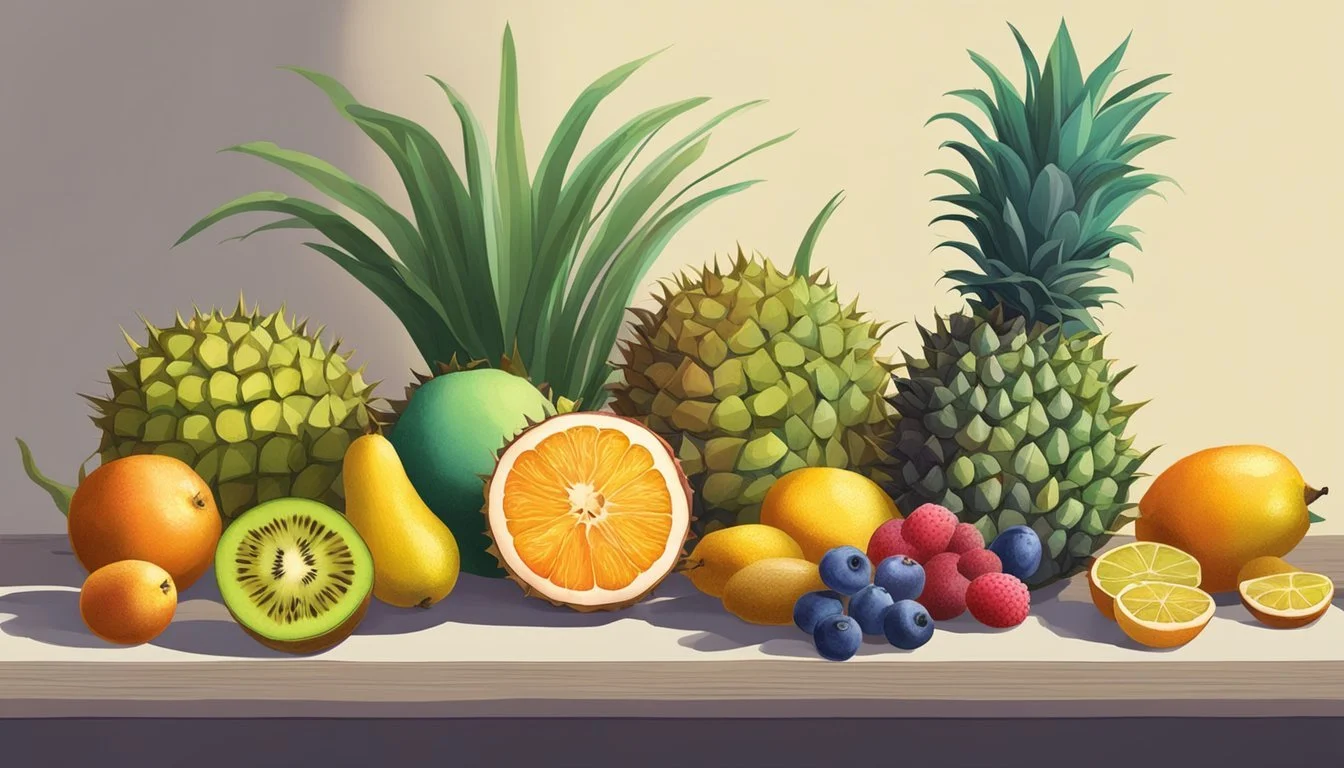Can Diabetics Eat Exotic Fruit?
Nutritional Insights and Guidelines
Managing diabetes often involves closely monitoring carbohydrate intake and making mindful food choices. For those wondering whether exotic fruits can be part of a diabetes-friendly diet, the answer is yes, with some considerations. Many exotic fruits, such as dragon fruit and kiwi, are not only rich in fiber but also packed with essential vitamins and antioxidants, making them suitable for people with diabetes.
Fruits like dragon fruit offer a mild flavor and a nutrient profile that supports overall health without causing significant spikes in blood sugar levels. Pairing these fruits with other healthy foods can create balanced meals that fit well within a diabetes nutrition plan. The key is to consume them in controlled portions, similar to any other carbohydrate-rich food.
Moreover, choices like berries, apples, and citrus fruits are recommended by health organizations like the American Diabetes Association for their beneficial effects on blood sugar control. Integrating exotic fruits into meals can diversify the diet while maintaining stable glucose levels, contributing to better diabetes management and enhanced enjoyment of food.
Understanding Diabetes and Diet
Managing diabetes involves careful planning of meals to regulate blood sugar levels and maintain overall health. Key factors include the role of carbohydrates and the importance of a balanced diet.
The Role of Carbohydrates in Diabetes Management
Carbohydrates directly impact blood sugar levels. When consumed, they break down into glucose, raising blood sugar.
Tracking carbohydrate intake is essential for diabetics. Knowing how many grams of carbs are in each serving helps maintain stable blood sugar levels. Foods like bread, pasta, and certain fruits are high in carbs and should be consumed in controlled portions.
The glycemic index (GI) ranks foods based on how they affect blood sugar. Low-GI foods, such as lentils and non-starchy vegetables, have a gradual impact on blood sugar. High-GI foods, like white bread and sugary snacks, cause rapid spikes.
Meal planning should incorporate low-GI foods and consider the total carbohydrate count. Balanced meals with a mix of protein, fat, and carbs help prevent sudden blood sugar fluctuations.
Importance of a Balanced Diet for Diabetics
A balanced diet provides essential nutrients and supports overall health. Diabetics need to focus on variety and portion sizes.
Fruits and vegetables should be a vital part of the diet. Non-starchy vegetables, such as spinach and broccoli, are low in carbs and high in fiber. While some fruits contain more sugar, consuming them in moderation can be beneficial. Pairing fruits with protein or fat, like nuts or yogurt, can slow glucose absorption.
Proteins and healthy fats are critical. Lean meats, fish, eggs, nuts, and seeds offer protein without raising blood sugar. Healthy fats from sources like avocados and olive oil support heart health.
Monitoring portion sizes can prevent overeating and help maintain blood sugar levels. Using tools like measuring cups or a food scale can be helpful.
In summary, a detailed focus on carbohydrate management and maintaining a balanced diet are key components for managing diabetes effectively.
Health Benefits of Exotic Fruits
Exotic fruits offer a multitude of health benefits, including a rich supply of vitamins, minerals, antioxidants, and fiber. These components are particularly valuable for managing diabetes, obesity, and metabolic syndromes.
Nutritional Profile of Common Exotic Fruits
Exotic fruits like dragon fruit, papaya, and guava are rich in essential nutrients. Dragon fruit is packed with vitamin C, fiber, and antioxidants. It is low in calories, making it ideal for those managing blood sugar levels. Papaya contains vitamin C, fiber, and flavonoids which can help lower blood glucose levels.
Guava is another excellent choice, brimming with vitamin A, vitamin C, and dietary fiber. It has a low glycemic index, making it beneficial for diabetics. These fruits offer a diverse array of nutrients that support overall health, particularly in managing and preventing diabetes.
Antioxidants and Fiber Content
The antioxidant properties in exotic fruits help combat oxidative stress, which is often higher in individuals with diabetes. Dragon fruit offers a high amount of antioxidants, including betacyanins, known for their anti-inflammatory properties.
Papaya also stands out due to its high fiber content, which aids in digestion and stabilizes blood sugar levels by slowing glucose absorption. Guava provides both antioxidants and soluble fiber, essential for controlling glycemic levels and improving insulin sensitivity.
By incorporating these exotic fruits into the diet, individuals can benefit from the natural compounds that aid in reducing inflammation, improving blood sugar control, and enhancing overall metabolic health.
Exotic Fruit Choices for Diabetics
For those with diabetes, selecting the right exotic fruits can positively impact blood sugar levels. The focus should be on fruits with a low glycemic index and those high in fiber.
Low Glycemic Index Fruits
Dragon Fruit
Dragon fruit, or pitaya, is a low-GI fruit with a GI value around 48. Renowned for its striking appearance and mild flavor, it is rich in antioxidants and essential vitamins. Consuming dragon fruit may help stabilize blood sugar levels, making it a smart choice for diabetics.
Papaya
Papaya has a glycemic index of 23, making it an excellent choice for maintaining stable blood glucose levels. It's also packed with vitamin C and flavonoids. Including papaya in the diet can be beneficial when eaten in moderation, especially in the morning.
Kiwi
Kiwi, with a GI value of 50, offers substantial nutritional benefits. This fruit is packed with vitamin C, vitamin K, and fiber. Its low glycemic index helps control blood sugar spikes, making it suitable for diabetics.
Fruits High in Fiber
Passion Fruit
Passion fruit is notable for its high fiber content, which aids in slowing the absorption of sugar into the bloodstream. It provides approximately 10.4 grams of fiber per cup, which helps manage blood sugar levels effectively. Passion fruit also contains beneficial antioxidants.
Guava
Guava boasts a significant amount of dietary fiber, approximately 9 grams per cup. Its fiber content assists in controlling blood sugar levels by slowing down digestion. Guava is also rich in vitamin C and can be an advantageous addition to a diabetic diet.
Avocado
Although not commonly thought of as a fruit, avocado is rich in healthy fats and fiber. It contains about 10 grams of fiber per avocado, which helps regulate blood sugar levels. Its healthy fats further enhance its role in blood sugar management, making it an excellent choice for those with diabetes.
Consumption Guidelines for Exotic Fruits
Diabetics can enjoy exotic fruits, but following portion size recommendations and considering the form of the fruit—fresh or processed—can help manage blood sugar levels effectively.
Portion Size Recommendations
Proper portion size is key for diabetics when eating exotic fruits. A small piece of whole fruit or half a cup of fresh, diced fruits such as mango or dragon fruit provides a balanced intake of natural sugars. For fruits like guava or pomegranate, half to one cup per serving is ideal.
It is important to avoid large quantities. Excessive consumption can lead to spikes in blood sugar levels. Diabetics should aim for no more than 15 grams of carbohydrates per serving. This can usually be achieved with small to moderate portions of exotic fruits.
Fresh vs Processed Fruit Considerations
Fresh fruits are generally the best option for diabetics. They contain natural sugars and fibers that help moderate blood sugar levels. When eating fresh, whole fruits, it is easier to track intake and avoid hidden sugars.
Canned fruits often come with added sugars or syrups. If opting for canned versions, choose those packed in water or natural juice with no added sugars. Dried fruits can be higher in concentrated sugars; small portions, about ¼ cup, are advisable.
Fruit juices should be consumed in very small amounts due to their high sugar content. A third to half a cup of pure fruit juice can equal one serving of carbohydrate, making it less suitable for regular consumption.
Incorporating Fruit into a Diabetic Diet
Incorporating fruit into a diabetic diet involves careful planning to ensure balanced blood sugar levels. By selecting appropriate fruits and portion sizes, individuals can enjoy the benefits of fruit without causing spikes in glucose.
Creating a Diabetes-Friendly Meal Plan
Creating a diabetes-friendly meal plan involves selecting fruits that are low in glycemic index (GI) and high in fiber. Berries, plums, cherries, and kiwis are excellent choices.
Utilizing a meal plan guided by a registered dietitian or diabetes educator can help in balancing carbohydrates throughout the day. It’s essential to monitor total carbohydrate intake, aiming for about 15 grams per serving. Including fruits in meals rather than eating them alone can help stabilize blood sugar.
For instance, adding slices of apple to a salad with lean protein or pairing berries with Greek yogurt provides a balanced approach. Keeping a food diary can also aid in tracking food intake and understanding personal blood sugar responses to different fruits.
Healthy Fruit-Based Snack Ideas
Healthy fruit-based snack ideas are crucial for maintaining steady blood sugar and preventing overeating. Opt for combinations like apple slices with almond butter or a mix of berries with a handful of nuts.
Fruit salsas made with mango or peach alongside a lean protein source can also be a refreshing option. Frozen grapes or a small container of fresh berries make convenient snacks that are easy to portion.
Mixing fruit salad with nuts and seeds can offer sustained energy without a rapid spike in blood sugar. For those looking for a tropical twist, dragon fruit is low in sugar and can be enjoyed on its own or blended into a smoothie.
Regular consultation with a dietitian or diabetes educator can help refine snack choices and portion sizes, ensuring they align with individual health goals.
Exotic Fruits to Approach with Caution
Diabetics must be cautious with certain exotic fruits due to their high sugar content and the potential complications of consuming them in canned or juiced forms. Understanding these aspects can help manage blood sugar levels effectively.
Fruits with High Sugar Content
Certain exotic fruits can be particularly high in sugar, posing a challenge for diabetics aiming to keep their blood glucose levels stable. Pineapples and overly ripe bananas are commonly noted for their elevated sugar levels.
These fruits can cause rapid spikes in blood sugar if consumed in large quantities. Watermelons, although hydrating, are another example due to their high glycemic index. It's crucial to balance these fruits with proteins or healthy fats to slow sugar absorption.
Considerations for Canned and Juiced Fruits
Consuming exotic fruits in canned or juiced forms can exacerbate sugar-related issues. Canned fruits often contain added sugars and syrups, which can lead to a significant increase in carbohydrate intake. Diabetics should read labels carefully and opt for fruits canned in water or natural juice without added sugars whenever possible.
Fruit juices, even those labeled as "100% fruit juice," can also contribute to erratic blood sugar levels due to their concentrated sugar content. Unlike whole fruits, juices lack fiber, which otherwise helps slow carbohydrate absorption. Consequently, it’s advisable to limit these products and prefer whole, fresh fruits.
Common Questions Addressed by Experts
Experts emphasize the importance of understanding which exotic fruits can be safely included in a diabetic diet and in what quantities. The guidance spans practical advice on servings and qualities from professional dietitians and standard recommendations from authoritative bodies.
Registered Dietitian Insights on Fruit Consumption
Registered dietitians often highlight that many exotic fruits contain essential vitamins and antioxidants beneficial for health.
For instance, guavas are rich in fiber and vitamin C, aiding in blood sugar management.
Dietitians note that portions and preparation methods are crucial.
Even fruits high in natural sugars, like mangoes, can be consumed in moderation.
They recommend pairing fruit with protein or healthy fats to slow sugar absorption. For example, eating papaya with a handful of nuts can be beneficial.
American Diabetes Association Recommendations
The American Diabetes Association (ADA) provides clear guidelines on incorporating fruits into a diabetic diet.
They stress that whole fruits are preferred over juices due to their fiber content. Examples include fresh berries, kiwi, and dragon fruit.
The ADA advises paying attention to serving sizes and blood glucose responses.
Fruits ranking lower on the glycemic index, like passion fruit, are generally recommended. They encourage monitoring individual blood sugar levels post-consumption to tailor fruit choices effectively.
These guidelines aim to combine nutritious benefits with effective blood sugar control.
Conclusion
Exotic fruits can be a beneficial addition to the diet of individuals with diabetes. They contain high levels of fiber and various bioactive compounds that support liver function and protect against diabetes-related metabolic issues.
In moderation, these fruits can help maintain a healthy weight. For diabetics, balanced consumption is key.
Some exotic fruits such as guava have shown promising results in managing blood sugar levels. Integrating these fruits into a balanced diet can offer a variety of nutrients.
It is important to monitor blood sugar levels closely when introducing new fruits into the diet.
Overall, consulting a healthcare professional before making dietary changes ensures that these fruits align with individual health goals.






